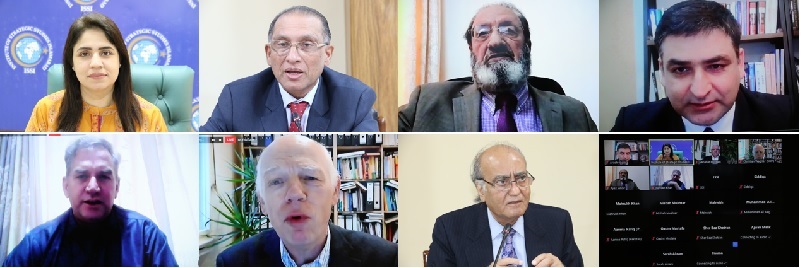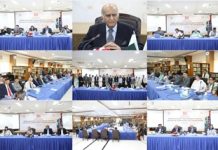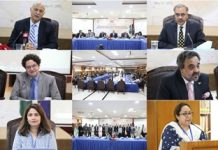PRESS RELEASE
Panel Discussion
Conversations on the Evolving Situation in Afghanistan: Pakistan’s Role in Afghanistan
November 2, 2021

The Centre for Afghanistan, Middle East & Africa (CAMEA) at the Institute of Strategic Studies Islamabad (ISSI) held a Panel Discussion on ‘Conversations on the Evolving Situation in Afghanistan: Pakistan’s Role in Afghanistan’ which is the ninth in a series of conversations CAMEA will be having on Afghanistan – under its Conversations on the on the Evolving Situation in Afghanistan series.
The distinguished speakers included: Ambassador Ayaz Wazir , Former Ambassador of Pakistan, Mr. Arash Yaqin, National Security Analyst with focus on South and Central Asia and Mr. Hassan Khan, Senior Journalist. Ambassador Aizaz Ahmad Chaudhry, Director General ISSI and Ambassador Khalid Mahmood also participated in the discussion.
During her opening remarks, Ms. Amina Khan, Director CAMEA stated that the situation in Afghanistan has drastically evolved since the Taliban took over as a result of US withdrawal from Afghanistan. While there is no doubt that with the US exit and in the absence of a negotiated settlement, a military takeover by the group was expected, the manner and the speed at which the transition has taken place not anticipated. Given its proximity to Afghanistan as well as religious and ethnic linkages, Pakistan is perhaps the most important regional player that has always been directly affected by events in that country. Since the takeover of the Taliban in August 2021, Islamabad’s policy towards the group has been guided by a regional approach, where Islamabad has been calling for an inclusive political set up, honoring human rights, as well as assurances from the group that Afghan soil will not be used against any state. At the same time, Pakistan is working with the regional countries to help avert the humanitarian crisis and has sent humanitarian aid to Afghanistan. Prime Minister Imran Khan has time and again stated that mistakes of the past should not be repeated, isolating Afghanistan is not a solution, and more importantly has been urging the international community to provide much-needed humanitarian aid for the people of Afghanistan.
Ambassador Aizaz Ahmad Chaudhry, in his opening remarks he shed light on the different aspects of the current situation in Afghanistan. These include the people of Afghanistan, how the Taliban will govern the country and the role of regional countries. He stated that the region cannot sit back and merely watch events unfold and instead it has to play a concrete role. Similarly, he elucidated how Pakistan has key concerns regarding the situation in Afghanistan. On the role of the international community, he said that there has been a consistent demand to engage with the Taliban and it is important to see how the Taliban regime can be incentivized to honor their commitments.
Ambassador Ayaz Wazir stated that, although the Taliban have taken control of Afghanistan, they still have to prove that they can deliver. He was of the view that the region wants a broad based and inclusive government and it is not easy for regional countries to recognise an un-inclusive government in Afghanistan. He outlined how Afghanistan is on the verge of economic collapse and if the looming situation in the country is not dealt with carefully it will result in a civil war. While talking about the role of Pakistan, he was of the view that Pakistan should be very careful about its relations with Afghanistan since the latter is a very important country for Pakistan and Islamabad has high stakes here. He went on to describe how the current situation in Afghanistan has adversely impacted trade and arrangements should be made to ensure hassle free trade. Moreover, Pakistan should keep all routes open round the clock. While talking about the question of recognition he mentioned that it should not be made conditional. While talking about the threat of terrorism and role of terrorist organisations he said that power and weakness in Afghanistan is dependent on how peaceful the country is. If peace prevails it will be very difficult for terrorist organisations to use Afghan soil against any country in the region. He concluded by saying that it is important to engage with the Taliban to bring peace into the country because it will ultimately lead to peace in the region.
Mr. Arash Yaqin said that the situation in Afghanistan has shocked everyone since no one had anticipated that the Taliban would take over the country in this way. Pakistan and Afghanistan both are important neighbours and Pakistan should not be blamed for what has happened in Afghanistan. He said that presently Afghanistan is in a kind of great game situation; on one hand between China, Russia and America and on the other hand between India, Pakistan, Iran and Saudi Arabia. He was of the view that the problem of Afghanistan is disastrous for all the stakeholders and the future is still unclear. The exit of Ashraf Ghani in such a hasty manner has left the country in a limbo. He said that now Taliban should not have to prove that they have won the county but now it is time for them to fulfill and honor their commitments which they have made with the Afghan people and to the entire international community. Those who failed Afghanistan in the past twenty years have fled the country and taken much needed financial resources of the country with them. As a result, the low level work-force of the previous government is facing a major economic crunch under the Taliban leadership. On Pakistan’s role he was of the view that Pakistan wants a friendly government and it should not repeat the past mistakes and that Islamabad needs to recalibrate its new role. At the moment, Afghanistan is facing several crises and Pakistan has an important role in overcoming them. Anti-Afghan sentiment among the public on both sides should be dealt with carefully, he concluded.
Mr. Hassan Khan said that Afghanistan is going through a very tough time and it is high time for the Afghan leadership to understand that now is the time to advocate for a peaceful Afghanistan. Regional countries are united in the belief that there should be stability and peace in Afghanistan. At this stage it is very important for the Taliban leadership to understand the demands of the international community. The group has to understand that they cannot fight the international processes and their responsibility is to serve and govern the Afghans, not through guns and bullets but in a softer, nuanced way. On Pakistan’s role he said no doubt that Pakistan is a key stakeholder and partner in the Afghanistan conflict. Pakistan has made a lot of bad decisions in the past and it needs to realise its responsibility. There is a perception in the Afghan youth that Pakistan had a part to play in Afghanistan’s destruction. This narrative needs to change. Going with the international community is in the best interest of Pakistan at this stage. Pakistan should follow what the international community is demanding from it. He also said that Pakistan should make institutional mechanisms to deal with the situation, normalize trade and open the borders. While talking about the concerns related to the security and terrorism he said that the Taliban will never sever relations with the TTP. Pakistan has an opportunity to play a part as good neighbors and explore new avenues in Afghanistan for increasing the bilateral relationship in a positive way.
In his concluding remarks, Ambassador Khalid Mahmood said that it is very clear that Pakistan and Afghanistan are closely bonded together and they have rightly been called as conjoined twins. It is in the best interest of Pakistan that peace returns to Afghanistan. He said that an inclusive political setup is important to have peace in the country and to deal with the emerging humanitarian and economic crisis which is emerging. Pakistan should do every possible thing to bring peace in the country by facilitating trade, border management and ensuring counter terreorim activities. He said that the Taliban government has certain responsibilities which include honoring their promises and commitments. But at the same time we should not be impatient in this regard because it will take time for them to deliver. He highlighted that instead of consolidating peace and stability, previous power holders had gone for regime change which was a wrong approach. Pakistan along with the international community should play a role as facilitator to bring peace in the country. The Taliban may have won the war but now they have to win the country by facilitating peace and stability in the country, he concluded.











